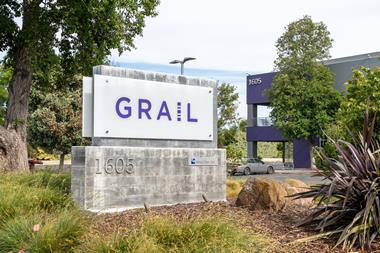EU and US competition authorities object to firms completing merger without approval
The EU slapped gene sequencing company Illumina with a record €432 million (£372 million) fine in July for going ahead with its acquisition of cancer detection firm Grail before competition authorities had cleared the deal.
The penalty reflected the European commission’s frustration with Illumina’s decision to proceed with its $8 billion acquisition in August 2021, despite knowing the commission had opened an in-depth investigation into the merger a few months earlier. ‘They opted for the risk of a gargantuan fine, rather than paying a breakup fee,’ says Salomé Cisnal de Ugarte, a competition lawyer at King & Spalding in Brussels, Belgium.
The EU can impose fines up to 10% of turnover on companies that intentionally breach the requirement to wait for commission approval. The commission described the infringement as ‘unprecedented and very serious’ and imposed the maximum fine.
Illumina’s troubles highlight renewed interest from major regulators in mergers and acquisitions, especially in sectors where innovation is crucial.
US travails
The record EU fine is just one of many twists and turns in the two companies’ history. Illumina actually spun off Grail in 2016, retaining majority ownership, to develop a pan-cancer screening test by measuring nucleic acids in blood samples. After billions in outside investment, Illumina had reduced its share of the company to 12% by August 2021. Grail’s flagship test, called Galleri, can be used to screen people for dozens of cancers before any symptoms become apparent.
But the proposed merger quickly ran afoul of regulators on both sides of the Atlantic. In the US, the Federal Trade Commission (FTC) sought to reverse the acquisition on grounds that it would harm innovation and increase prices.
The FTC lost its initial challenge, with Illumina arguing that reuniting the two companies would transform the detection of cancer by facilitating affordable access to Grail’s tests. But a panel of FTC commissioners reversed this decision in April of this year, and ordered Illumina to sell off Grail.
In a detailed opinion, the FTC concluded that the merger may substantially reduce competition for research, development and commercialisation of multi-cancer early detection (MCED) tests. Grail is in an innovation race with other cancer screening companies, according to the FTC.
Grail and its competitors rely on Illumina sequencing technology, and other sequencing companies cannot substitute for Illumina’s capabilities, the opinion noted. The FTC argued that Illumina will have an incentive to put competitors of Grail at a disadvantage.
‘They want to see the Grail equivalent make these tests and operate in a competitive market, where there’s a race between producers,’ says Rebecca Allensworth, a competition expert at Vanderbilt Law School in Nashville, US. ‘But Illumina has a monopoly over essential inputs to the cancer tests.’
Legal wranglings
The European commission similarly noted that the merger would push Grail’s rivals to depend on a direct competitor for a vital input. Illumina could cut them off from its technology, or disadvantage them, to gain a bigger share of the lucrative cancer screening market.
Ultimately, this would ‘lead to less innovation, less choice and higher prices for European citizens and healthcare systems,’ according to Margrethe Vestager, the EU’s competition commissioner. She noted that by 2035 the cancer screening market could exceed €40 billion annually.
Illumina has pushed back against US and European regulators. In April, it began an appeal against the FTC decision. ‘The appeal raises both [competition] questions, but also claims that the process by which the agency is proceeding is improper,’ says Stephen Calkins, professor of law at Wayne State University in Detroit, Michigan.
The company is also appealing a decision by the General Court of the European Union in 2022 that upheld the European commission’s right to examine the merger, despite the company not meeting revenue thresholds (since Grail had no revenues in Europe). ‘It is only on a point of law that this appeal is taking place,’ de Ugarte explains.
Illumina is now waiting for a decision by the European Court of Justice, expected late 2023 or early 2024. The company expects both the US and EU decisions to land around the same time, and promised to promptly sell off Grail if it does not win.
Lasting effects
The process has turned heads on both sides of the Atlantic. ‘Everything is very unusual in this case,’ says de Ugarte. She notes that the deal is a ‘vertical merger’ between companies that don’t compete directly. ‘That is usually considered less problematic, but here the commission decided to prohibit it. Its [also] unusual because the parties decided to go ahead with the transaction before receiving a decision,’ she adds.
In the US, the FTC would generally seek an injunction in federal to stop the merger, says Jeffrey Jacobovitz, a former FTC attorney and chair of antitrust and competition at Arnall Golden Gregory in Washington, DC in the US. ‘It’s a fairly unusual scenario here,’ he adds. The FTC sent the case to an administrative judge after the deal was consummated, lost the case, then successfully appealed within the agency. Now, the case will go to a federal appeals court.
‘The FTC hasn’t been very successful in court when challenging vertical mergers,’ notes Calkins. ‘But there is clearly a willingness to pursue that.’ Allensworth agrees that there has been a shift in attitude. ‘The FTC has been more aggressive than we have seen in the last 40 years in pushing theories such as the idea that a vertical merger can be anti-competitive,’ she says.
The protracted entanglement with regulators will not have gone unnoticed. Merging companies should now assume, says Calkins, ‘that getting a merger approved will take longer, be more expensive and have more risks and more uncertainty.’
De Ugarte adds that, generally, all competition authorities have increased their scrutiny of mergers and acquisitions. Calkins observes that there is a perception of more aggressive enforcement in Europe, but ‘the European commission actually does not block very many mergers, and it enters into a number of settlements with merging parties.’
In theory, there can be upsides to the parties in consummating a deal before the regulators without approval, says Calkins. ‘The deal can be run in a way that illustrates the benefits of the merger,’ he explains, ‘if it makes customers and suppliers happy, this creates witnesses who can say the merger has been good.’ It remains to be seen, however, if Illumina will manage to keep hold of Grail.

















No comments yet